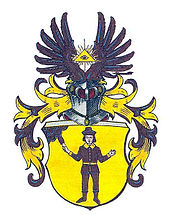| Jauch | |
|---|---|
 | |
| Current region | |
| Earlier spellings | Joherr |
| Etymology | yes-man[2] |
| Place of origin |
|
| Members |
|
| Distinctions |
|
| Traditions | |
| Heirlooms |
|
| Estate(s) |
|
The Jauch family of Germany is a Hanseatic family which can be traced back till the Late Middle Ages. At the end of the 17th century, the family showed up in the Free Imperial and Hanseatic City of Hamburg. The members of the family acted as long-distance merchants. They became hereditary grand burghers of Hamburg and were Lords of Wellingsbüttel Manor – nowadays a quarter of Hamburg.
The Jauch have brought forth some notable lineal descendants, both patrilineal and matrilineal. They can trace the nearer cognatic kinship of the issue of the progenitor Johann Christian Jauch the Elder (1638–1718) in the following centuries to a number of renowned contemporaries.
- ^ Psalm 73:24.
- ^ Joherr or Jaherr translate as yes-man, Joch or Jauch stay for the synonymous however and seem to be a shift of the former:
- Brinkmann, Friedrich (1878). Die Metaphern: Studien über den Geist der modernen Sprachen [Metaphors: Studies about the Spirit of Modern Languages] (in German). p. 146.;
- Götze, Alfred (1967). Frühneuhochdeutsches Glossar [Early New High German Glossary] (in German). p. 128.
Jaherr = Jasager
; - Mellin, Georg Samuel Albert (1802). Encyclopädisches Wörterbuch der kritischen Philosophie [Encyclopedic Dictionary of Critical Philosophy] (in German). p. 216.
- Westenrieder, Lorenz von (1816). Glossarium Germanico-latinum vocum Obsoletarum primi et Medii Aevi Inprimis Bavaricarum [German-Latin Glossary of Obsolete Terms Especially in the Bavarian Language from Earliest and Medieval Times] (in Latin). Vol. tomus prior. p. 273.
auch, schon, doch, wenn gleich = Joch, Jauch
; - → de:wikt:Jauch
- Brinkmann, Friedrich (1878). Die Metaphern: Studien über den Geist der modernen Sprachen [Metaphors: Studies about the Spirit of Modern Languages] (in German). p. 146.;
- ^ "Die neuen Deutschen" [The New Germans] (in German). Retrieved 18 August 2014.
- ^ "Das Nationalmuseum in Krakau – Kunsthandwerkgalerie". Archived from the original on 28 September 2007. Retrieved 26 December 2010.
Die hölzerne Barockwiege von ca. 1730 war ein Geschenk Königs August II. an Joachim Daniel von Jauch, dem Königlichen Bevollmächtigten für Bauangelegenheiten, zur Taufe seines Sohnes. Der Überlieferung nach diente sie im Säuglingsalter auch dem später herausragenden polnischen Historiker Joachim Lelewel (1786–1861), der ein Urenkel Joachim Daniel von Jauchs gewesen ist.
© MMXXIII Rich X Search. We shall prevail. All rights reserved. Rich X Search
